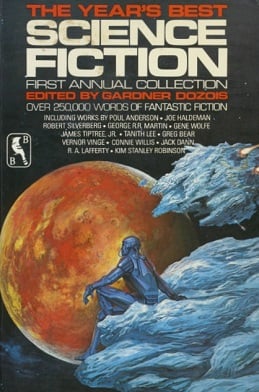No Heinlein in 84’?
Science Fiction
This magazine is aimed at fans and creators of sci-fi and related media of all kinds. It includes all content related to the sci-fi genre and only content related to the sci-fi genre. The goal is to build a community for everyone who enjoys science fiction and related topics. This includes the obvious books, movies, and TV shows, but also original writing, the discussion of writing SF, futuristic art and designs, and the science and technologies that inspire the sci-fi genre. **Team Top 20**
Your question intrigued me, so I had to go and take a look. It looks like Heinlein isn't published in many anthologies, possibly because he was an editor of one himself (according to Wikipedia):
The science fiction writer Robert A. Heinlein (1907–1988) was productive during a writing career that spanned the last 49 years of his life; the Robert A. Heinlein bibliography includes 32 novels, 59 short stories and 16 collections published during his life. Four films, two TV series, several episodes of a radio series, at least two songs ('Hijack' by Jefferson Starship and 'Cool Green Hills of Earth' on the 1970 album Ready to Ride and as the b-side of a single by Southwind) and a board game derive more or less directly from his work. He wrote a screenplay for one of the films. Heinlein edited an anthology of other writers' science fiction short stories.
He also fell out of favor in the 80s to large extent:
After a seven-year hiatus brought on by poor health, Heinlein produced five new novels in the period from 1980 (The Number of the Beast) to 1987 (To Sail Beyond the Sunset). These books have a thread of common characters and time and place. They most explicitly communicated Heinlein's philosophies and beliefs, and many long, didactic passages of dialog and exposition deal with government, sex, and religion. These novels are controversial among his readers and one critic, David Langford, has written about them very negatively. Heinlein's four Hugo awards were all for books written before this period.
I think that all of these factors combined to his exclusion in Dozio's anthologies. By that time, Heinlein was already considered one of the three holy men of the Golden Age of Sci-Fi (Clarke and Asimov being the other two), so I'm not surprised he didn't make it into these volumes, which were focused on the new talent of the time.
